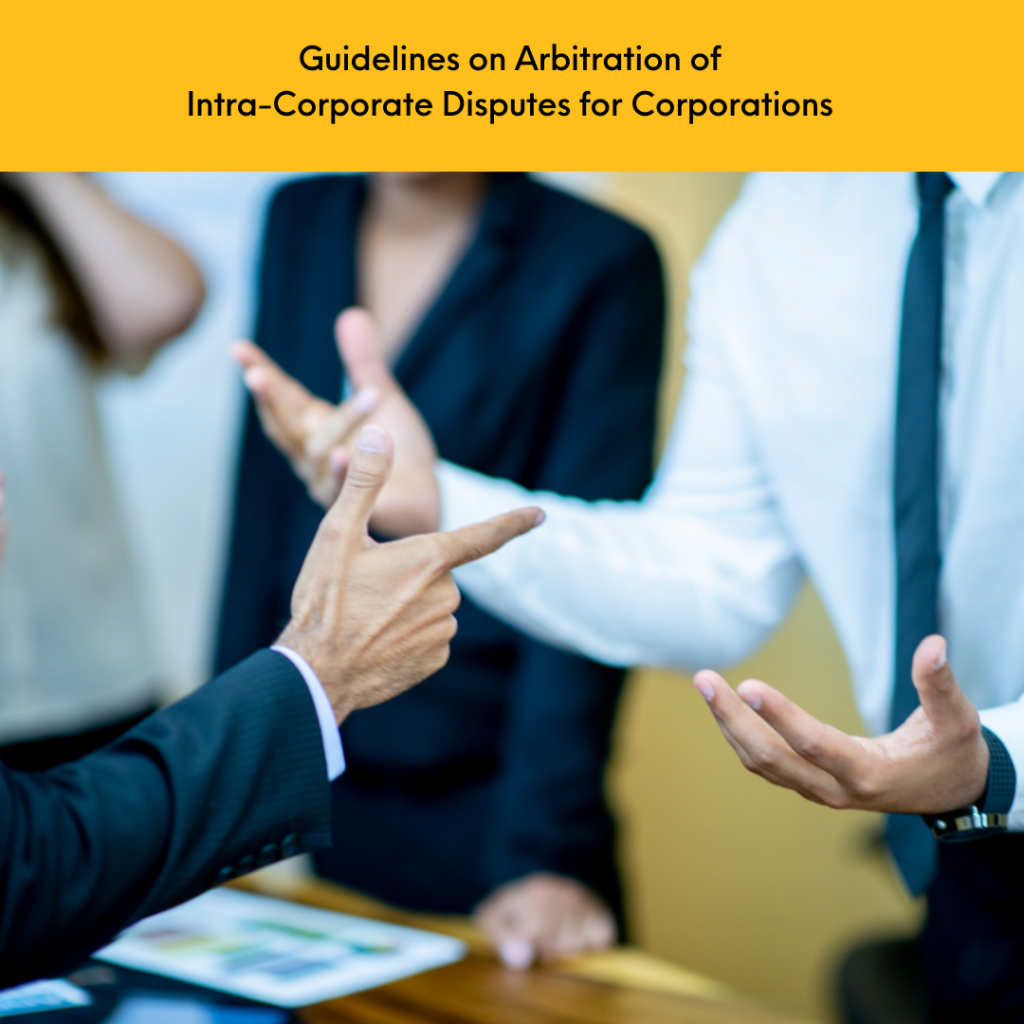
Published 10 October 2022, The Daily Tribune
One of the highlights of Republic Act 11232, otherwise known as the Revised Corporation Code (RCC), is the section on the inclusion of an arbitration agreement for intra-corporation issues. The provision for arbitration mechanism to resolve disputes with the corporation is one of the examples which support the position that the RCC codified internationally-accepted practices and norms in conducting business.
Section 181 states that an arbitration agreement may be provided in the articles of incorporation or bylaws of a corporation. The same Section provides that the Securities and Exchange Commission (SEC) shall formulate the rules and regulations, which shall govern arbitration, subject to existing laws on arbitration.
More than three years since the effectivity of the RCC, the SEC operationalized the above-stated provision by releasing last month SEC Memorandum Circular No. 8, Series of 2022, which provides for the guidelines on arbitration of intra-corporate disputes for corporations.
Arbitration, as defined in the guidelines, is a “voluntary dispute resolution process in which one or more arbitrators, appointed by the parties’ designated independent third party or in accordance with the rules, resolve a dispute by rendering an award.” According to the SEC, through guidelines on arbitration, this will allow corporations to resolve intra-corporate disputes promptly without going to court.
Disputes between the corporation, stockholders or members which arise from the implementation of the articles of incorporation and bylaws or intra-corporate relations shall be referred to arbitration. Disputes which involve criminal offenses and interests of third parties shall be non-arbitrable.
Expanding Section 181, the guidelines provide that a domestic corporation may provide an arbitration agreement in its articles of incorporation or bylaws, as well as in the form of a separate agreement. The arbitration agreement shall bind the corporation, its directors, trustees, officers, and executives or managers, even if such were not signatories to the articles of incorporation, bylaws, or separate agreement.
The rules will not apply if the arbitration agreement explicitly states that the seat or place of arbitration is other than the Philippines. However, the seat or place of arbitration shall be presumed to be the Philippines unless the arbitration agreement stated otherwise. Exception to the foregoing would be if the arbitral tribunal subsequently decides otherwise.
Some of the salient portions of the guidelines are the following: the minimum requirements of an arbitration agreement; the referral to arbitration; the appointment of arbitrators; and the powers of the arbitral tribunal.
Minimum Provisions
To be enforceable, an arbitration agreement must state: (1) the number of arbitrators which may either be one or three; (2) the designated independent third party who will appoint the arbitrator; (3) the procedure for the appointment of the arbitrator; and (4) the period within which the arbitrator should be appointed by the designated independent third party.
The guidelines provide that arbitration agreements that do not comply with such requirements shall be unenforceable, although arbitration shall still proceed under Republic Act No. 9285, or the Alternative Dispute Resolution Act of 2004.
Referral to Arbitration
When an intra-corporate dispute is filed with a Regional Trial Court despite the adoption of an arbitration agreement in the corporation’s articles of incorporation, bylaws, or in a separate agreement, the Regional Trial Court shall act in accordance with the rules of procedure that the Supreme Court may promulgate to implement Section 181.
Appointment of Arbitrator/s
To proceed with arbitration, a designated independent third party will have the power to appoint the arbitrator or arbitrators forming the arbitral tribunal. The guidelines define a third party as any person, other than the corporation, its director, trustees, officers, stockholder or member, and executives or manager.
If such designated appointing authority failed to select the arbitrator/s in the manner or within the period specified in the arbitration agreement, a party may request the SEC to appoint the arbitrator/s.
The guidelines provide that arbitrators must be accredited by the Office for Alternative Dispute Resolution (OADR) under the Department of Justice or the SEC, or by organizations accredited by the OADR or the SEC for the purpose of arbitration.
Powers of the Arbitral Tribunal
The arbitral tribunal shall have the power to rule on its own jurisdiction and on questions relating to the validity of the arbitration agreement. It shall also have the power to grant the necessary interim measures to ensure enforcement of the award, prevent a miscarriage of justice, or otherwise protect the rights of the parties.
Interim measures may include: preliminary injunction directed against a party to the arbitration; preliminary attachment against property or garnishment of funds in the custody of a bank or third person; appointment of a receiver; detention, preservation, delivery or inspection of property; or appointment of a management committee.
The other salient portions shall be discussed in the next article.
For more of Dean Nilo Divina’s legal tidbits, please visit www.divinalaw.com. For comments and questions, please send an email to cabdo@divinalaw.com.

